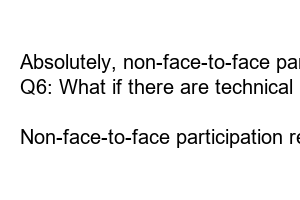주민등록 사실조사 비대면 참여
Title: Non-Face-to-Face Participation: A Seamless Approach to Resident Registration Fact-Finding
Introduction:
In our ever-evolving digital age, non-face-to-face participation has emerged as a convenient and efficient method for various tasks. One such important endeavor is the resident registration fact-finding process, which plays a crucial role in community management and government operations. In this blog post, we will explore the benefits, applications, and commonly asked questions about non-face-to-face participation in resident registration fact-finding.
Subheadings:
1. What is Non-Face-to-Face Participation?
Non-face-to-face participation refers to any form of engagement that does not require physical presence or direct interaction. It enables individuals to remotely complete tasks, such as resident registration fact-finding, using digital platforms and innovative technologies.
2. The Role of Non-Face-to-Face Participation in Resident Registration Fact-Finding:
By allowing residents to participate without visiting a physical registration center, non-face-to-face methods enhance convenience and accessibility. Online registration forms, mobile applications, and video calls facilitate seamless data collection, hindered by time constraints or mobility issues inherent in face-to-face interactions.
3. Safeguarding Privacy and Data Security:
Non-face-to-face participation technology ensures the highest level of privacy and data security. Robust encryption protocols, multi-factor authentication, and stringent data protection measures safeguard personal information provided during registration. Residents can confidently share their details, knowing that strict security protocols are in place.
4. The Advantages of Non-Face-to-Face Participation:
a) Efficiency: Non-face-to-face participation eliminates the need for time-consuming visits to registration centers, significantly reducing wait times and bureaucratic hurdles.
b) Flexibility: Residents can engage in registration activities at their convenience, eliminating constraints posed by office hours or commuting.
c) Accuracy: Digital platforms offer intuitive interfaces and validation mechanisms, minimizing errors and ensuring accurate data collection.
d) Cost-effectiveness: By reducing reliance on physical infrastructure, non-face-to-face participation minimizes operational costs involved in traditional fact-finding processes.
5. Common Applications of Non-Face-to-Face Participation in Resident Registration Fact-Finding:
a) Online Registration Portals: User-friendly platforms facilitate self-registration, document submission, and verification processes.
b) Mobile Applications: Dedicated apps enable residents to complete their registration using smartphones, ensuring ease-of-access for all.
c) Video Calls: Remote video conferencing enables face-to-face interactions when necessary, offering a personal touch while avoiding physical visits.
d) Electronic Signature: Authorized digital signatures ensure the authenticity and legality of submitted documents, reducing paperwork and administrative hassle.
6. FAQs:
Q1: Is non-face-to-face participation secure?
Yes, stringent privacy and data security measures are implemented to protect personal information throughout the registration process.
Q2: Are non-face-to-face methods recognized legally?
Yes, non-face-to-face participation is legally recognized and widely accepted as an efficient alternative to traditional face-to-face methods.
Q3: Can elderly or individuals with limited technical skills participate?
Yes, user-friendly interfaces and support services are designed to cater to diverse user demographics, ensuring inclusivity and accessibility.
Q4: Are there any additional costs associated with non-face-to-face participation?
No, non-face-to-face participation is a cost-effective alternative that eliminates the need for physical infrastructure and associated expenses.
Q5: Can non-face-to-face participation be used for other applications beyond resident registration fact-finding?
Absolutely, non-face-to-face participation has wide-ranging applications across various sectors, including government services and administrative procedures.
Q6: What if there are technical issues during non-face-to-face participation?
Support services and helplines are readily available to assist users in resolving any technical difficulties encountered during the process.
Summary:
Non-face-to-face participation revolutionizes traditional resident registration fact-finding processes by leveraging digital platforms and innovative technologies. This approach offers efficiency, convenience, and accuracy while ensuring privacy and data security. With its myriad applications, non-face-to-face participation is an inclusive, cost-effective, and accessible option for residents to engage in the fact-finding process, simplifying community management and government operations in the modern world.

